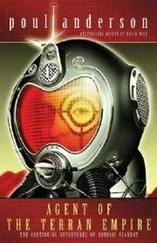Poul Anderson - Star of the Sea
Здесь есть возможность читать онлайн «Poul Anderson - Star of the Sea» весь текст электронной книги совершенно бесплатно (целиком полную версию без сокращений). В некоторых случаях можно слушать аудио, скачать через торрент в формате fb2 и присутствует краткое содержание. Жанр: Фантастика и фэнтези, на английском языке. Описание произведения, (предисловие) а так же отзывы посетителей доступны на портале библиотеки ЛибКат.
- Название:Star of the Sea
- Автор:
- Жанр:
- Год:неизвестен
- ISBN:нет данных
- Рейтинг книги:5 / 5. Голосов: 1
-
Избранное:Добавить в избранное
- Отзывы:
-
Ваша оценка:
- 100
- 1
- 2
- 3
- 4
- 5
Star of the Sea: краткое содержание, описание и аннотация
Предлагаем к чтению аннотацию, описание, краткое содержание или предисловие (зависит от того, что написал сам автор книги «Star of the Sea»). Если вы не нашли необходимую информацию о книге — напишите в комментариях, мы постараемся отыскать её.
Star of the Sea — читать онлайн бесплатно полную книгу (весь текст) целиком
Ниже представлен текст книги, разбитый по страницам. Система сохранения места последней прочитанной страницы, позволяет с удобством читать онлайн бесплатно книгу «Star of the Sea», без необходимости каждый раз заново искать на чём Вы остановились. Поставьте закладку, и сможете в любой момент перейти на страницу, на которой закончили чтение.
Интервал:
Закладка:
In the thorp Edh was never alone. Nobody ever was. Houses crowded against the wall. In each, stalls for cows or the horses that a few men owned ran along one side, bedsteads along the other. A stone-weighted loom stood near the door for light to weave and sew by, a bench and table at the far end, a clay hearth in the middle. Food and housewares hung from the roof beams or lay across them. The buildings opened on a yard where pigs, sheep, fowl, and gaunt dogs wandered loose around a well. Life crammed together, talking, laughing, singing, weeping, lowing, neighing, grunting, bleating, cackling, barking. Hoofs thumped, wagon wheels creaked, hammer clashed on anvil. Lying in the dark between straw and sheepskin, among the warm smells of animals, dung, hay, embers, you could hear a baby cry till Mother gave it suck, or she and Father thrash about for a while gasping and groaning, or from outside a howl at the moon, a rush of rain, the wind sough or whine or roar—and that other noise, somewhere, what was it, a night-raven, a troll, a dead man out of his howe?
There was much for a little girl to watch whenever she was free, comings and goings, breeding and bearing, hard work and hard frolic, skilled hands shaping wood, bone, leather, metal, stone, the holy days when folk offered to the gods and feasted. . . . When you grew bigger they took you with them and you saw the car of Niaerdh go by, covered that none might behold her; you wore an evergreen garland and strewed last year’s flowers in her path and sang to her in your thin voice, it was joy and renewal but also awe and an unspoken underlying fear. . . .
Edh grew onward. Bit by bit she got new tasks that took her farther and farther off. She gathered dry twigs for kindling, woad and madder for dyes, berries and blossoms in season. Later she went in a band to the woods for nuts and to the strand beyond for shells. Later yet, first with a gleaning basket, a year or two after with a sickle, she helped harvest the fields to the south. Boys herded the livestock, but often girls brought them food and might well linger most of a long, long summer’s day. Outside the brief busy times of year, folk seldom had anything to hurry for. Neither did they fear anything but sickness, baneful witchcraft, night-beings, and the anger of the gods. No bears or wolves prowled the Eyn, and no foes had sought this poor part of it within living memory.
Thus, more and more as she changed from child to maiden, Edh could stray off by herself, over the heath till her moodiness blew from her. Commonly she ended by the sea, and there she might well sit, lost in the sight, until shadows and a breeze plucked at her sleeve to say she had better go home. From the limestone heights on the western shore she looked across to the mainland, dim with distance; from the sandy east she saw only water. It was enough. In every weather it was enough. Waves danced bluer than heaven, snow streaks of foam on their shoulders, snowstorms of gulls above. They ran heavy, green and gray, their manes flew in the wind, their galloping beat through the ground into her bones. They surged, battered, bellowed, embittered the air with spindrift. They laid a molten road toward her from a low sun, they dimpled beneath oncoming rain and gave it back its rushing noise, they cloaked themselves in fog and whispered unseen of things unknown. Niaerdh was in them with dread and blessing. Hers were the kelp and upcast amber, hers the fish, fowl, seals, great whales, and ships. Hers was the quickening in the land when she came ashore to her Frae, for her sea embraced it, warded it, mourned for its winter death and called it back to life in spring. Very small amidst these things, hers was the child she had kept in this world.
So Edh grew toward womanhood, a tall, shy, slightly awkward girl with a gift for words when she chose to speak of things other than the everyday. She wondered much about them, and spent much time in a waking dream, and when alone might suddenly break into tears, not knowing quite why. Nobody shunned her, but nobody sought her out either, for she had stopped sharing the tales she made and there was otherwise something a little odd about Hlavagast’s daughter. This was the more true after her mother died and he took a new wife. They two did not get along well. Folk muttered that Edh sat too often by Godhahild’s grave.
Then one day a youth of the thorp saw her walk by. Wind blew hard over the heath and her loose brown hair tossed full of sunlight. He, who had never hung back, found that his throat froze tight and the heart fluttered in his breast. A long time passed before he could utter a word to her. She lowered her eyes and he barely heard how she answered. After a while, though, they learned to feel easier.
This was Heidhin Viduhada’s son. He was a lean, dark lad, short on merriment but sharp of wits, tough and lithe, good at weapon-play, a leader among his fellows albeit some of them hated him for his toploftiness. None cared to tease him about Edh.
When they saw how it was going, Hlavagast and Viduhada went aside for a talk. They agreed that such a linking of their families would be welcome, but a betrothal should wait. Edh’s courses had begun just last year; the youngsters might fall out, and an unhappy marriage meant trouble for everybody; abide and see, and meanwhile drink a stoup of ale to the hope of a glad outcome.
Winter passed, rain, snow, cavernous darknesses, the night of fear before the sun turned back and the day of feast that followed, lightening skies, thaw, newborn lambs, budding boughs. Spring brought leaves and northbound wings; Niaerdh rode about the land; men and women coupled in the fields where they would plow and sow. The Sun Car rolled ever higher and slower, green swelled, thunderstorms flashed and banged above the heath, rainbows glimmered far out at sea.
Time came for the market at Kaupavik. Alvaring men gathered their wares and busked themselves. Word thrilled from homestead to homestead: this year a ship had arrived from beyond the Anglii and Cimbri, from realms of the very Romans.
No one knew much about Romaburh. It lay somewhere remote in the South. But its warriors were like locusts, they had eaten land after land; and finely made things trickled out of those realms, glass and silver vessels, metal discs bearing faces, unbelievably lifelike little figures. The stream must be strengthening, for more such goods reached the Eyn every year. Now, at last, Roman chapmen had themselves made it to the country of the Geats! Those who stayed behind in Laikian watched with envy those who left.
Having scant work to do just then, they took comfort in idleness. No sign of evil marked that day a sennight later when Edh and Heidhin strolled west to the shore.
Huge reached the heath, man-empty once they left the thorp out of sight, treeless and flat, so that most of the world was sky. Dizzyingly tall the clouds loomed, dazzlingly white, in a blue without bounds. Light and heat fell from the sun like rain. Poppies flared red, gorse yellow, amidst the murky ling. When they sat down for a while they caught a scorched smell of spurrey; bees hummed in a silence through which larksong drifted earthward; then wings racketed, a grouse hastened low overhead, they looked into one another’s eyes and laughed aloud at their own astonishment. Walking, they held hands, no more, for theirs was a chaste folk and he felt himself the warder of a fragile sacredness.
Their path skirted the bluffs that stretched north from the farms and brought them through woods to a strand. Starred with wildflowers, grass grew nearly to the water’s edge. Wavelets chuckled on stones they had long since worn smooth. Farther out they gleamed and glinted. Across the channel, the mainland shadowed the horizon. Closer, cormorants on a rock dried their wings in the breeze. A stork flew by, white bearer of luck and growth.
Читать дальшеИнтервал:
Закладка:
Похожие книги на «Star of the Sea»
Представляем Вашему вниманию похожие книги на «Star of the Sea» списком для выбора. Мы отобрали схожую по названию и смыслу литературу в надежде предоставить читателям больше вариантов отыскать новые, интересные, ещё непрочитанные произведения.
Обсуждение, отзывы о книге «Star of the Sea» и просто собственные мнения читателей. Оставьте ваши комментарии, напишите, что Вы думаете о произведении, его смысле или главных героях. Укажите что конкретно понравилось, а что нет, и почему Вы так считаете.










